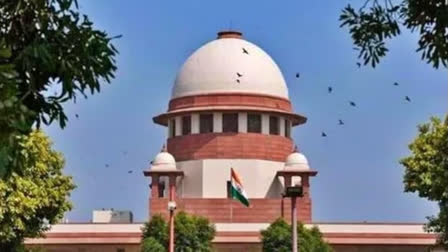New Delhi:The Supreme Court Friday asked AIIMS, New Delhi, medical board to examine if there is any abnormality in the foetus of a married woman, who is pregnant for more than 26 weeks now. The apex court also asked the medical board to examine the health status of the woman, who claimed to suffer depression and severe postpartum psychosis.
A bench led by Chief Justice of India D Y Chandrachud and comprising Justices J B Pardiwala and Manoj Misra said advocate Amit Mishra, counsel for the woman, submitted a bunch of prescriptions that petitioner is going treatment for postpartum psychosis since 10 October 2022. The bench said the initial handwritten prescription doesn't specify that the nature of the ailment for which the drugs were administered and observed that all prescriptions are silent on nature of ailment.
The Chief Justice said having regards to the Medical Termination of Pregnancy Act, it would be necessary to have a medical opinion of AIIMS on the following: whether the foetus is suffering from any abnormality? Whether there is any evidence to suggest that continuance of pregnancy full term would be jeopardized by drugs prescribed.
The apex court noted that the earlier report of AIIMS states that the foetus is normal, in order to place the matter beyond doubt, further report may be submitted. The Chief Justice said AIIMS is at liberty to carry out their own independent evaluation of mental and physical condition of petitioner. The apex court asked the petitioner to appear before the AIIMS medical board today and scheduled the next hearing in the matter on Monday.
On Thursday, the apex court asked the 26-week pregnant woman to reconsider her decision to terminate the pregnancy and carry the pregnancy for a few more weeks so that the child isn't born with any deformities.
A bench led by the Chief Justice of India stressed that there are rights of the unborn child too and woman's autonomy is important of course. The bench said she has a right under Article 21 but equally, “we must be conscious of the fact that whatever is done will affect the right of the unborn child”.
The bench told the petitioner’s counsel, “Who is appearing for the unborn child? You're for the mother…..How do you balance the rights of the unborn child? It's a living viable foetus. Today its chances of survival are there….”.
